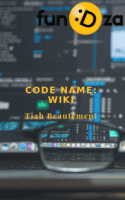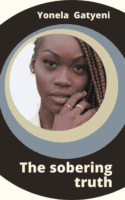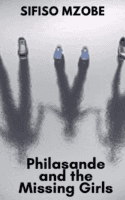It seems incredible that on our planet today, in our country today, there live millions of people without even electricity, people who have never used a cellphone or the internet. And in contrast there also live millions of people who are completely ‘wired’. They have the unimaginable power of computers and the mind-boggling information store of the internet at their fingertips.
This is the stark ‘digital divide’, and our big-brained hero, Wiki, knows which side of it she wants to be on in her future. As she says of her code essay: “I wanted to illustrate how not being able to code in some capacity will make us illiterate in the future job market. According to experts like Ryan Bubinski, coding will no longer be a job in itself, but considered a basic job skill.”
Ryan Bubinski is a real person: Google him! And FYI, wannabe geeks, his website, “Codecademy is an online interactive platform that offers free coding classes in 12 different programming languages…” (Wikipedia)
All formal work in the world today involves computers using encoded instructions. To be a modern teacher or doctor or plumber or farmer or mechanic or illustrator or book-keeper or stock controller you must be computer literate, using specialist programmes written by coders for your job.
Even till points, for example, use ‘brainy’ coded programmes. In a fast food chain such as Steers, the teller places your order via a computer system in the till point, and you pay and your change is worked out by the system.
Then, every night, details of every single order that was processed in that Steers is automatically sent to a central computer and sorted along with the thousands of others from every Steers branch in the country. The bosses in Joburg use the data to decide if a product or store is going well, or needs a menu change, for example. Code has been written for every step of that process, except the final decisions. Code is everywhere!
Part of the digital divide is the money divide. If you can’t afford unlimited data or airtime, you’re at a disadvantage. No wonder South Africans yell ‘Data must fall!’ and complain about prices and data ‘expiring’. Remember how Renée loses out:
“But it’s the end of my month, so it’s all gone. Supposedly going to ‘roll over’ but it never seems to happen. Stupid school should let us use their wifi.”
At the competition the team come up against financial privilege: “There were all these fancy teams who could afford to buy extra Lego pieces to add to their kit and lived in homes with ADSL, wireless broadband or fibre.”
But here is the future: some (not rich) countries have already acknowledged that internet communication must be free everywhere. “The reason for Lithuania’s speediness is simple: heavy investment and prioritization of free public Wi-Fi … along with other Eastern European countries such as Croatia (No. 2), Estonia (No. 3), and Romania (No. 5).” Newsweek Magazine *
The story also shows how mobile phones can help countries like ours to ‘leapfrog’ over the need for personal computers and landlines. Teacher Tebogo explains to Wiki: “Even if I just had some better keyboards with the right attachments, then students could hook up to their phones to work on some coding.”
Another divide the story touches on is that of language. Baka is teased for suggesting in his essay that ‘Chinese’ (rather than Mandarin) should be taught as there is so much Chinese investment in Africa. Access to an internationally-used language is an advantage. And indeed, this year (2018) we have actually had our first 20 Matrics writing … Mandarin!*
And, as we all know, being fluent in the international language of the colonizer, English, is still a must for tertiary study or to get a good job. Little progress is being made to boost the other official languages in higher education and business.
Finally, let’s go to a divide of a different, social sort: that of being an ‘outsider’ versus ‘insider’ in society. Our main character, Wiki, is brilliant and has an extraordinary memory, but seems however to be at the very mild end of a continuum of what is called ‘autism spectrum disorder’. People with this condition are often obsessive – like she is about ‘facts’. They find it hard to ‘read’ social situations and people’s expressions. They often don’t ‘get’ jokes or sarcasm or the hidden meaning behind what people say, or what metaphors mean.
Wiki knows she is ‘different’ and is not sure if the gang are really ‘friends’ or if Clinton really is attracted to her as a ‘boyfriend’. Look what she tells the reader:
“I can’t tell if I’m a joke or if people really did find it interesting,” and, “I check their faces, as I’m always unsure how much people really want to know. I can go on and on sometimes.”
Look what happens in this exchange, started by Renee:
Her grin widens. “You and me are going to have to chat more about this. Much more. When,” and she gives Clinton a pointed look, “it’s just us girls.”
“I might skip soccer practice today,” Clinton says.
“Why?” I ask.
Everyone starts laughing, making me feel dumb.
In this last quote, Wiki was unable to assume or infer that Clinton didn’t want to leave her alone with ‘the girls’.
Happily, we know that Wiki is starting to bridge the divide because, “… I’m learning to enjoy my friends more and more”. Her supportive, understanding boyfriend, Clinton, is helping her do this, and is going at a romantic pace she can handle. It warms the reader’s heart and brings a smile at the end of the story when she says: “I do really enjoy growing closer to him … when we kiss – wow! That’s all I can really say about that. Sometimes facts are not the answer to everything.”
* https://www.newsweek.com/lithuania-wifi-internet-net-neutrality-fastest-637754




